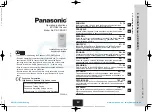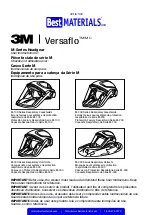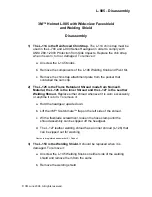
56
rectangular rackmount units.
EQ (equalizer)
The part of your mixer (or other device) that manipulates an audio signal
by lowering the level of some frequencies and increasing the levels of
others. EQ is used to fine-tune a signal’s highs and lows.
fader
A device that allows you to control the level of an audio signal by sliding
the fader up and down a straight path. Each input channel of the
MultiMix has its own fader, and so do the MAIN MIX and ALT 3/4.
USB2.0
A standard for connecting external devices to a computer.
gain
The measure of extra amplification applied to an audio signal. Channels
1 – 4 on your MultiMix have gain controls, which are useful for boosting
mic and line signals.
latency
The time it takes for audio to travel from the MultiMix, through the
computer and the recording program, and out again. Latency is
measured in either samples or milliseconds.
level
The amount of power driving an audio signal. The most common
names given to levels of varying voltage are, from lowest to highest,
microphone level, instrument level and line level.
master section
The section of a mixer where the main mix is controlled.
mic preamp
An amplifier that boosts a microphone-level signal up to line level.
mixer
A device whose purpose is to combine and output a number of audio
signals, allowing various types of signal manipulation.
mono (monaural) Refers to an audio signal that has only one channel. The opposite of
stereo.
pan
A control that lets you position a mono signal within the stereo spectrum
by altering the level of the signal being sent to the left channel as
opposed to the right.
phantom power A way of providing power to condenser microphones. Called
“phantom” because the power isn’t apparent to dynamic microphones
when you connect them to an input that provides phantom power.
post-fader
Describes an aux send that sends a signal that already has passed through
the channel fader.
pre-fader
Describes an aux send that sends a signal that has not passed through the
channel fader.
return
A line input whose function is to carry back to the mixer an audio signal
that has been sent from the mixer. Usually used in the application of
Summary of Contents for MULTIMIX 16
Page 1: ...Reference Manual...
Page 2: ...This page intentionally left blank 10 20 30 40 50 60 70 80 90 100...
Page 6: ...Table Of Contents 4...
Page 12: ...Introduction 10 This page intentionally left blank...
Page 50: ...6 Troubleshooting non USB2 0 48 This page intentionally left blank...
Page 52: ...7 Troubleshooting USB2 0 50 This page intentionally left blank...
Page 55: ...9 Block Diagrams 53...
Page 56: ...9 Block Diagrams 54...



































